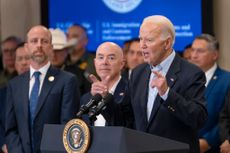Is America the main obstacle to peace in Korea?
There's only one way Korea would unify — and the United States won't stand for it


Though it's still winter in Pyeongchang, where the world's athletes are competing in the 23rd Olympic Winter Games, the heralds of spring are already twittering and tweeting across the Korean peninsula and around the world. Kim Yo Jong, sister of North Korean leader Kim Jong Un, successfully charmed the international media. Her brother has been calling for further efforts at reconciliation, and South Korean President Moon Jae-in, notwithstanding his surprisingly forceful response to North Korean provocations over the past year, is surely inclined to pursue such efforts.
Officially, both North and South Korea favor reunification. So why has there been essentially no progress towards that goal since the fall of the Soviet Union made the Cold War confrontation obsolete?
The obvious answer would be: because North Korea is a giant Stalinist prison camp, a routine violator of human rights on an industrial scale, a nuclear proliferator and supporter of terrorism, ruled by a degenerate and half-mad dynasty whose latest scion murdered his own brother to secure his position on the throne. And all of these things are true. But they are not by any means the whole truth, nor even the most important part of it.
Subscribe to The Week
Escape your echo chamber. Get the facts behind the news, plus analysis from multiple perspectives.

Sign up for The Week's Free Newsletters
From our morning news briefing to a weekly Good News Newsletter, get the best of The Week delivered directly to your inbox.
From our morning news briefing to a weekly Good News Newsletter, get the best of The Week delivered directly to your inbox.
Consider the position of the Kim family, and the North Korean state, from a purely rational perspective. If the only path to reconciliation is through dismantling its nuclear deterrent, upending the ideological basis of the regime, and surrendering its leadership to international human rights prosecutors, then of course reconciliation is impossible — and, indeed, nobody truly favors it. In that case, South Korea's true aim must be not reunification, but conquest: to force North Korea to collapse and then take over. Which is precisely what North Korean propaganda says.
But there is ample evidence that this is not what South Korea wants at all. The collapse of the North Korean regime would present the South with a sudden and massive humanitarian catastrophe for which it would bear the brunt of the cost and logistical responsibility. Far better to have some kind of negotiated transition for the North out of Stalinism, however long it might take. While pro-reunification sentiment has declined substantially in recent years, particularly among younger South Koreans, that's primarily because of concerns about the economic toll, and not because of increased commitment to anti-communism.
As for the military threat, South Korea is certainly not happy with North Korea going nuclear, but not because those weapons appreciably augment the North's threat to the South. Unlike tanks and fighter planes, nuclear weapons are not very useful tools of conquest, and North Korea's massive arsenal of artillery pieces already gave it the capacity to inflict horrifying damage on South Korea, with civilian casualties estimated in the tens or even hundreds of thousands. South Korea's paramount goal is not destroying the North Korean regime, but making sure it has no reason to attack — neither to initiate a conflict, nor to retaliate for an attack upon it.
Rationally speaking, then, South Korea should be open to some kind of reconciliation framework that leaves the two states largely intact while symbolically proclaiming unification and an end to the Korean War. If it's concerned primarily with regime survival — which the preponderance of evidence suggests is the case — then North Korea should be amenable to something similar. So what's the problem?
Well, where would such an endgame leave the United States?
It is vanishingly unlikely that North Korea — or its Chinese allies — would agree to any formal program for reunification while American troops remained in South Korea and our alliance remained intact. North Korea built its nuclear deterrent in the first place because, in the wake of the collapse of the Soviet Union, there was ample reason to believe that the United States would seek to resolve the long-dormant Korean conflict by force. And much of America's foreign policy since the end of the Cold War — from incorporation of a reunified Germany, the Warsaw Pact states and the Baltic republics into NATO, to the two wars in Iraq, to the intervention in Libya — has given the Kim family every reason to believe that trusting America to respect North Korean independence or the Kim family's interests would be folly.
But consider how the prospects for unification would look if the United States simply abandoned the field. From Beijing's perspective, the value of its alliance with North Korea would drop to zero, if not lower. South Korea would be a far more valuable partner in both the short and the long term, and Beijing's primary goal would be to convince South Korea to become that partner without alarming Japan into rearmament. Crucial to that effort would be bringing North Korea fully to heel, which would require convincing the Kim family that their best hope for survival would be putting themselves completely in Beijing's hands and entering into reconciliation talks on the basis of full denuclearization and elimination of its missile program. The Kim family would have few other options than to agree — and they would have more reason to trust Beijing than Washington to avoid interfering with their internal politics.
The readiest path to political reconciliation between the two Koreas, in other words, requires imagining that the United States would be willing to surrender its influence on the Korean Peninsula. This, of course, would have consequences beyond Korea. If Washington were willing to hand Seoul to Beijing, surely we'd be willing to hand off Taipei, Bangkok, and Manila. Even Tokyo wouldn't be out of the question. The ripple effect across the region would leave China the overwhelmingly dominant power in the Western Pacific. Those are the potential stakes for the United States, and they go far toward explaining why sharp observers of President Moon believe the main goal of his subtle policy toward the North of mixed threat and diplomacy is to reduce tensions without provoking American opposition.
None of the foregoing means that the United States is wrong to try to hold onto its influence in Korea, nor even that South Korea doesn't appreciate having the United States in its corner. Seoul would far prefer to play Washington and Beijing off each other than to submit to Chinese domination. And if conflict were to come, America is by far the most powerful ally in the world to have. All that talk about being the leaders of the free world isn't just chin music.
Still, we shouldn't be fooled by the moral posturing of the international commentariat — or the vice president. There are no realistic prospects for non-violent regime change in North Korea, and trying to force change by violence would risk killing hundreds of thousands, if not millions, on both sides of the DMZ. The most plausible path to truly ending the Korean conflict is through an agreement between the two Koreas that leaves the brutal Kim regime in place. And the main obstacle to any such agreement is the material interests of the United States.
Create an account with the same email registered to your subscription to unlock access.
Sign up for Today's Best Articles in your inbox
A free daily email with the biggest news stories of the day – and the best features from TheWeek.com
Noah Millman is a screenwriter and filmmaker, a political columnist and a critic. From 2012 through 2017 he was a senior editor and featured blogger at The American Conservative. His work has also appeared in The New York Times Book Review, Politico, USA Today, The New Republic, The Weekly Standard, Foreign Policy, Modern Age, First Things, and the Jewish Review of Books, among other publications. Noah lives in Brooklyn with his wife and son.
-
 India elections start amid violence, hate speech accusations
India elections start amid violence, hate speech accusationsTalking Points Narendra Modi seeks a third term while critics worry about the future of the country's democracy
By Joel Mathis, The Week US Published
-
 'Biden is smart to keep the border-security pressure on'
'Biden is smart to keep the border-security pressure on'Instant Opinion Opinion, comment and editorials of the day
By Harold Maass, The Week US Published
-
 Bird flu worries mount as virus found in milk, cows
Bird flu worries mount as virus found in milk, cowsSpeed Read The FDA found traces of the virus in pasteurized grocery store milk
By Peter Weber, The Week US Published
-
 Puffed rice and yoga: inside the collapsed tunnel where Indian workers await rescue
Puffed rice and yoga: inside the collapsed tunnel where Indian workers await rescueSpeed Read Workers trapped in collapsed tunnel are suffering from dysentery and anxiety over their rescue
By Sorcha Bradley, The Week UK Published
-
 Gaza hospital blast: What the video evidence shows about who's to blame
Gaza hospital blast: What the video evidence shows about who's to blameSpeed Read Nobody wants to take responsibility for the deadly explosion in the courtyard of Gaza's al-Ahli Hospital. Roll the tape.
By Peter Weber, The Week US Published
-
 Giraffe poo seized after woman wanted to use it to make a necklace
Giraffe poo seized after woman wanted to use it to make a necklaceTall Tales And other stories from the stranger side of life
By Chas Newkey-Burden, The Week UK Published
-
 Helicopter sound arouses crocodiles
Helicopter sound arouses crocodilesTall Tales And other stories from the stranger side of life
By Chas Newkey-Burden, The Week UK Published
-
 Woman sues Disney over 'injurious wedgie'
Woman sues Disney over 'injurious wedgie'Tall Tales And other stories from the stranger side of life
By Chas Newkey-Burden, The Week UK Published
-
 Emotional support alligator turned away from baseball stadium
Emotional support alligator turned away from baseball stadiumTall Tales And other stories from the stranger side of life
By Chas Newkey-Burden, The Week UK Published
-
 Europe's oldest shoes found in Spanish caves
Europe's oldest shoes found in Spanish cavesTall Tales And other stories from the stranger side of life
By Chas Newkey-Burden, The Week UK Published
-
 Artworks stolen by Nazis returned to heirs of cabaret performer
Artworks stolen by Nazis returned to heirs of cabaret performerIt wasn't all bad Good news stories from the past seven days
By The Week Staff Published